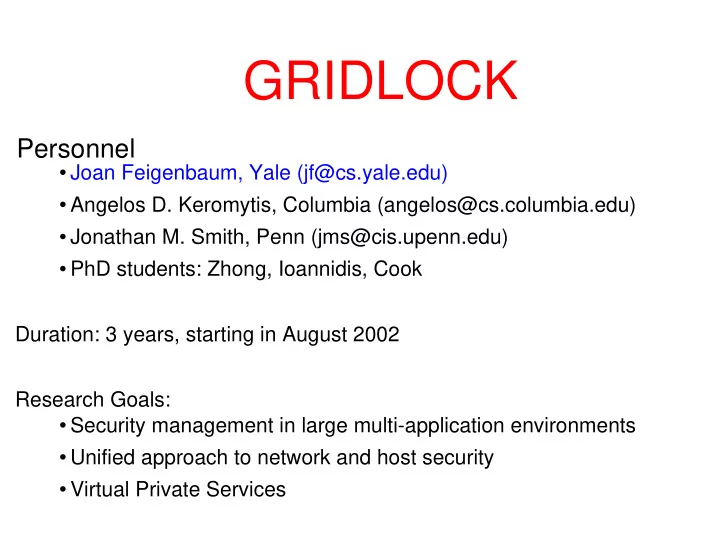

GRIDLOCK Personnel Joan Feigenbaum, Yale (jf@cs.yale.edu) Angelos D. Keromytis, Columbia (angelos@cs.columbia.edu) Jonathan M. Smith, Penn (jms@cis.upenn.edu) PhD students: Zhong, Ioannidis, Cook Duration: 3 years, starting in August 2002 Research Goals: Security management in large multi-application environments Unified approach to network and host security Virtual Private Services
General Problem Network and host security are now handled separately Incompatible configurations of components Leads to lack of end-to-end coherence Security vulnerabilities Loss of functionality VPN Configuration Apache Policy File Server Packet filtering Network ACLs Host−based CGI CGI Remote FS Local FS Firewall File ACLs File ACLs Web Server Outside Inside View−based ACLs Credit Card DB
GRIDLOCK Hypothesis Unification of network and host access-control mechanisms Technical components: Globally specified, locally interpreted policies Domain-specific policy meta-languages Virtual Private Services: Extend OS notions of virtual machine and process isolation to distributed systems Policy Host2 Host1 Network Layer File Server File Server FS View1 Host 1 Host N FS View1 FS View2 Policy Policy Policy Network Layer FS View2 File System Data Base File System . . . Web Server Host3 Policy Policy Policy Policy Network Layer Data Base CGI1 Other Network Other Network DB View1 CGI2 DB View2
Virtual Private Services Examples, in increasing order of complexity: Distributed database Virtual network infrastructure Virtual organization To achieve vision, we need: Efficient policy-enforcement mechanisms for the different components High-level, domain-specific policy languages Tools for verifying correctness and consistency Automated administration Starting point: trust management KeyNote trust-management system Distributed policy expressed explicitly and via credentials
Challenges Devising good application-domain (AD) languages Expressive, usable, efficiently implementable Cover multiple applications within a domain Managing diverse security mechanisms Example: filesystem vs. firewall semantics Conflict resolution and non-monotonicity Scalability Automating administration Performance
Current Activities Develop tools PEPL: framework for creating AD-specific languages DisCFS: credential-based network filesystem WebDAVA: user-managed, web-based file storage Translate AD-specific policies to KeyNote Use conflict-resolution capabilities of trust-management engines Augment existing access-control points with KeyNote Lightweight decision making Leverage localization of access control for scalability Enhance KeyNote as needed
Planned Experimentation Deploy shared filesystem across the three institutions Combine file-access control, firewall configuration, and web-server ACLs Use environment for joint authoring of reports and papers Implement full-fledged distributed database Extend to storage marketplace Integrate payment mechanism Virtual organization Combine network services and distributed-database services Integrate VPN and QoS capabilities
First-Year Accomplishments Sample of publications from first year - "EasyVPN: IPsec Remote Access Made Easy," USENIX LISA, October 2003 - "Secure and Flexible Global File Sharing," USENIX Freenix, June 2003 - "Experience with the KeyNote Trust Management System: Applications and Future Directions," 1st International Conference on Trust Management, May 2003 - "Design and Implementation of Virtual Private Services," IEEE WETICE, June 2003 - "WebDAVA: An Administrator-Free Approach to Web File-Sharing," IEEE WETICE, June 2003 - "Sprite: A Simple, Cheat-proof, Credit-based System for Mobile Ad-Hoc Networks," IEEE Infocom, April 2003 - "Verifiable Distributed Oblivious Transfer and Mobile Agent Security," DIALM/POMC, September 2003 DisCFS prototype (http://www.seas.upenn.edu/~miltchev) PEPL compiler ��(http://www.cs.columbia.edu/~angelos/Code/canon31.tar.gz) WebDAVA prototype (http://www.cs.columbia.edu/~angelos/Code/dava-demo.tar.gz)
Recommend
More recommend